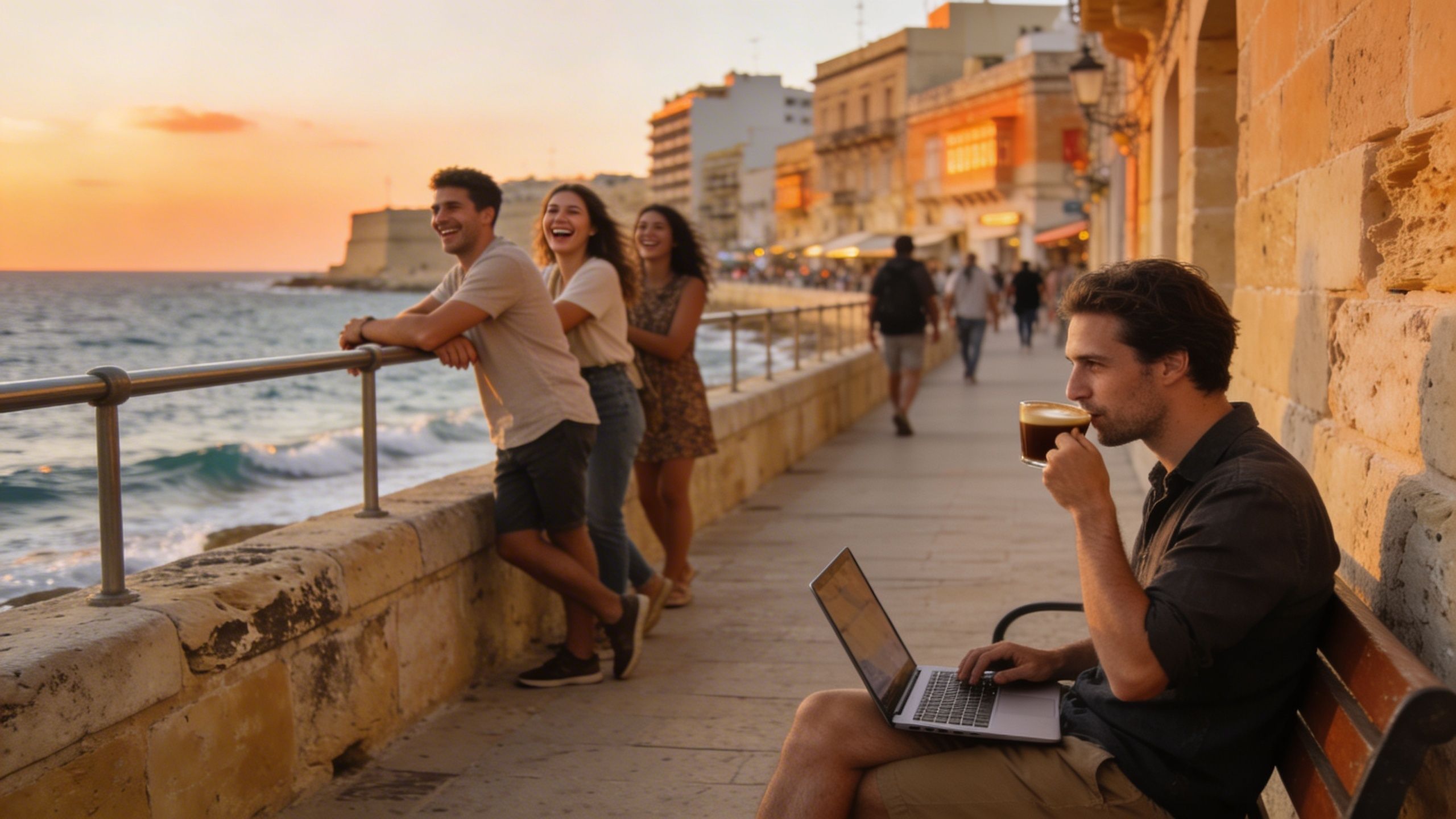Malta: Sunlit Streets, Nomad Life & Market Realities
Sun, stone streets and steady price growth: how Malta’s lifestyle and recent market shifts affect nomad buyers and what to check before you buy.
Imagine sipping espresso on a Valletta roof terrace at sunrise, laptop open, the Grand Harbour glittering below. That feeling—city history at your feet, Mediterranean light in your inbox—explains why people fall for Malta. But love alone doesn't buy the right home. Recent NSO price data shows steady rises; know the rhythms before you bid. (See NSO RPPI Q2/2025.)
Living Maltese Days: compact, sunlit, social

Malta is compact and immediate. Mornings mean bakeries on Triq ir‑Rabat (Mdina) or coffee on Gzira’s seaside promenade. Afternoons can be work‑focused—coworking hubs in St Julian’s and Sliema—or beach dips at Għajn Tuffieħa. Evenings bring a mix: family dinners, festas with fireworks, or rooftop drinks in Valletta. The island’s small scale turns errands into walks and neighbours into acquaintances.
Valletta & The Three Cities — history as a daily backdrop
Picture living in a narrow stone street where Baroque facades catch golden hour. Valletta and the Three Cities offer cobbled charm and short walks to museums, ferry links, and buzzy cafés—perfect for culture lovers who want to work from inspiring corners. Apartments here are characterful but can be smaller and pricier per square metre, so prioritise layout and light over raw space.
Sliema, Gzira & St Julian’s — the nomad triangle
If you want cafes with fast Wi‑Fi, coworking and seafront promenades, Sliema, Gzira and St Julian’s are the practical choices. You’ll find international restaurants, walking routes, and evening energy. These areas attract remote workers and expats, which means more short‑let competition but also established services—think postal agents, gyms, and English‑speaking medical clinics.
- Lifestyle highlights: Valletta cafés, Gzira promenade walks, St Julian’s sunsets, Għajn Tuffieħa beach swims, Marsaxlokk Sunday fish market, Ta’ Qali weekend craft markets.
Making the move: how lifestyle shapes what to buy

Dreams set the brief: a roomy terrace for lunches, a bright spare room for a desk, or a quiet backstreet studio for writing. But market realities matter. PwC and local reports show resilient demand for residential stock—so you’ll compete for well‑located homes. Match your must‑haves (internet speed, outdoor space, walkability) to neighbourhood pros and cons before you tour.
Property types and the life they offer
Stone townhouses in Valletta give you history and terraces but often need renovation. Modern apartment blocks in Sliema or Swieqi deliver reliable wiring and lifts—handy if you work with clients online. Maisonettes and penthouses usually mean private outdoor space: crucial for all‑day remote work balance. Think about soundproofing (old walls echo), AC capacity for hot summers, and where a quick café or coworking desk sits relative to your front door.
How local experts help you marry lifestyle with value
- 1. Spot neighbourhood microtrends — agents know which streets are seeing new cafés or refurbished properties. 2. Read contracts with a local lawyer — property rules and title checks are island‑specific. 3. Measure connectivity — ask agents for advertised and tested broadband speeds. 4. Discover off‑market options — some owners prefer discreet sales through local contacts. 5. Budget for seasons — tourism peaks affect short‑let demand and negotiating power.
Insider knowledge: what expats wish they’d known
Two big practical notes: first, recent EU rulings changed the investor citizenship landscape, shifting some high‑net‑worth demand patterns that once pushed prices in specific segments. Second, the NSO’s RPPI shows steady mid‑single‑digit growth—so timing and neighbourhood choice affect negotiation room. Both trends mean smart buyers think seasons, local policy shifts, and community fit, not just headline price tags, when making offers.
Making friends, learning local rhythms
English is an official language, which flattens daily life for many expats, but Maltese culture is distinct. Festa season (summer) pulses the island with community gatherings—join a village feast and you’ll be welcomed. Coworking hubs and coliving spots (Gzira, Sliema, Valletta) are the fastest route to friends and local gigs. Expect warm, social neighbours but also a respectful pace: shops often close mid‑afternoon on certain days.
Longer term: when Malta grows with you
Over years, buyers see Malta’s compactness as an asset: shorter commutes, concentrated services, and resilient rental demand. If you expect career growth or family changes, choose flexible spaces—rooms that convert to offices, terraces that host dinners, and neighbourhoods with schools and healthcare nearby. Keep an eye on NSO reports to track price momentum by quarter and adjust offers accordingly.
- Practical buying checklist: tested by nomads who moved here • Verify broadband with a speed test and ask the agent for recent results. • Check seasonality: inspect a property both in low and high tourist season. • Ask neighbours about noise and ferry/boat schedules. • Confirm title details and PoSA/deed timelines with a Maltese lawyer. • Budget for renovations in older stone properties (electrics, damp-proofing).
Conclusion: Malta isn’t a postcard you buy—it’s a compact, lived neighbourhood you move into. If you prioritise sea access, café culture, fast internet and community, pick a pocket of the island and work with local agents who know which streets match that lifestyle. Start with short stays in your favourite neighbourhood, test the morning routines and connectivity, then make an offer informed by NSO data and local insights. We’ll help you find the neighbourhood that feels like home.
Swedish, relocated to Marbella in 2018 to chase sun and property freedom. Focus on legal navigation and tax for Nordic buyers.


